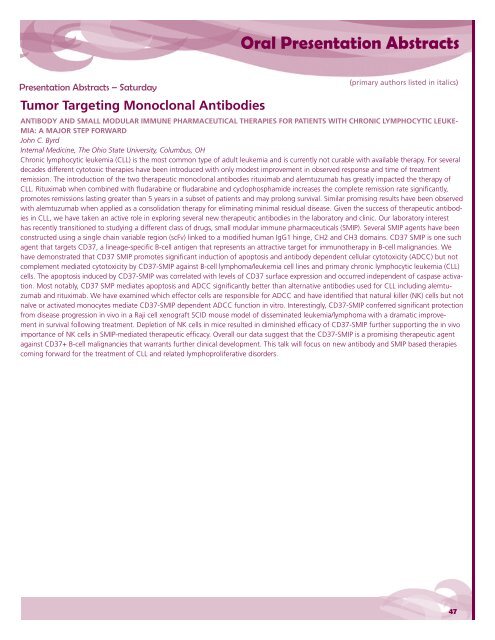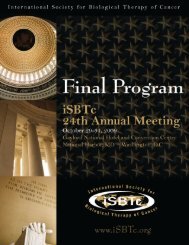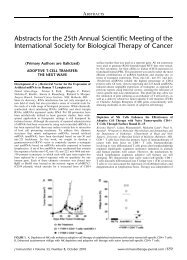Oral Presentation AbstractsPresentation Abstracts – Saturday(primary authors listed in italics)CYTOTOXIC T LYMPHOCYTE-ASSOCIATED ANTIGEN 4 BLOCKADE ENHANCES POLYFUNCTIONAL NY-ESO-1 SPECIFIC T CELL RE-SPONSES IN METASTATIC MELANOMA PATIENTS WITH TUMOR REGRESSIONJianda Yuan 1,4 , Sacha Gnjatic 2 , Hao Li 1,4 , Sarah Powel 4 , Humilidad Gallardo 4 , Erika Ritter 2 , Teresa S. Rasalan 4 , Gregor Manukian 1,4 , YinyanXu 1,4 , Stephanie Terzulli 4 , Gerd Ritter 2 , Lloyd Old 2 , James P. Allison 1,3 , Jedd D. Wolchok 1,41Ludwig Center <strong>for</strong> <strong>Cancer</strong> <strong>Immunotherapy</strong>, Memorial Sloan Kettering <strong>Cancer</strong> Center, New York, NY2Ludwig Institute <strong>for</strong> <strong>Cancer</strong> Research, New York Branch, Memorial Sloan Kettering <strong>Cancer</strong> Center, New York, NY3Howard Hughes Medical Institute, Memorial Sloan Kettering <strong>Cancer</strong> Center, New York, NY4Department <strong>of</strong> Medicine, Memorial Sloan Kettering <strong>Cancer</strong> Center, New York, NYBlockade <strong>of</strong> the inhibitory signals mediated by cytotoxic T lymphocyte-associated antigen 4 (CTLA-4) has been shown to enhance T cellresponses and induce objective, durable clinical responses in patients with metastatic melanoma. The functional impact <strong>of</strong> anti-CTLA-4therapy on human immune responses is still unclear. To explore this, we analyzed immune-related adverse events and immune responses inmetastatic melanoma patients treated with ipilimumab, a fully human anti-CTLA-4 monoclonal antibody. We have treated a large cohort<strong>of</strong> refractory metastatic melanoma patients enrolled on two phase II trials <strong>of</strong> Ipilimumab, sponsored by Bristol-Meyers Squibb. Patients hadreceived a variety <strong>of</strong> prior chemotherapies and immunotherapies, including one patient who was previously immunized with a NY-ESO-1 proteinvaccine. Patients received an induction regimen with 4 doses <strong>of</strong> Ipilimumab at 10 mg/kg given every 3 weeks or a blinded dose (0.3, 3 or10 mg/kg) given along the same schedule. Patients were eligible <strong>for</strong> maintenance doses every three months if clinical benefit was observedin the absence <strong>of</strong> significant toxicity. Fifteen Ipilimumab-treated patients were selected on the basis <strong>of</strong> availability <strong>of</strong> a suitable panel <strong>of</strong> specimens<strong>for</strong> immunologic monitoring, and eight <strong>of</strong> these showed evidence <strong>of</strong> clinical benefit (partial or complete responses or stable disease <strong>for</strong>> 24 weeks). Five <strong>of</strong> the eight clinical responders had NY-ESO-1 antibody, whereas none <strong>of</strong> seven clinical non-responders were seropositive<strong>for</strong> NY-ESO-1. All five NY-ESO-1 seropositive patients had clearly detectable CD4+ and CD8+ T cells against NY-ESO-1; One NY-ESO-1 seronegativeclinical responder also had a NY-ESO-1 CD4+ and CD8+ T cell response, possibly related to prior vaccination with NY-ESO-1. Amongfive clinical non-responders analyzed, only one had a NY-ESO-1 CD4+ T cell response and this patient did not have detectable anti-NY-ESO-1antibody. Overall, NY-ESO-1-specific T-cell responses increased in frequency and quality during anti-CTLA-4 treatment, revealing a polyfunctionalresponse pattern <strong>of</strong> IFN-γ, MIP-1β and TNF-α. We there<strong>for</strong>e suggest that CTLA-4 blockade enhanced NY-ESO-1 antigen-specific B celland T cell immune responses in patients with durable objective clinical responses.RADIOFREQUENCY ABLATION WITH KS-IL2 IMMUNOCYTOKINE (EMD 273066) RESULTS IN AN ENHANCED ANTITUMOR EFFECTAGAINST MURINE COLON ADENOCARCINOMAErik Johnson 1 , Brett Yamane 1 , Alexander Rakhmilevich 2,4 , David Mahvi 1,4 , Stephen Gillies 5 , Paul Sondel 2,3,41Surgery, University <strong>of</strong> Wisconsin, Madison, WI2Human Oncology, University <strong>of</strong> Wisconsin, Madison, WI3Pediatrics, University <strong>of</strong> Wisconsin, Madison, WI4Paul P. Carbone Comprehensive <strong>Cancer</strong> Center, University <strong>of</strong> Wisconsin, Madison, WI5EMD-Serono Lexigen Research Center, Billerica, MABackground: Radi<strong>of</strong>requency ablation (RFA) is a common treatment modality <strong>for</strong> surgically unresectable tumors. In this pre-clinical work, wesought to enhance the antitumor effect from RFA by adding immunotherapy in the <strong>for</strong>m <strong>of</strong> the huKS-IL2 immunocytokine (EMD 273066)given to mice bearing CT26-KS colon adenocarcinoma. The huKS-IL2 immunocytokine (huKS-IL2) is an experimental immunotherapeuticreagent, comprised <strong>of</strong> a humanized IgG1 antibody that detects the KS-antigen (an epitope on the human Epithelial Cell Adhesion Molecule),that is over-expressed on most epithelial carcinomas, including colon cancer.Results: The addition <strong>of</strong> huKS-IL2 treatment to RFA-treated mice resulted in a significantly greater antitumor response as measured by suppression<strong>of</strong> tumor growth, compared to untreated animals and those treated with RFA or huKS-IL2 alone. Animals treated with huKS-IL2 + RFA alsohad significantly enhanced survival compared to all other treatment groups. Further, after conditions were optimized, treatment with RFA +huKS-IL2 resulted in complete tumor resolution <strong>of</strong> established disease in 50% <strong>of</strong> mice, whereas under these conditions no mice in other groupsresolved tumors. When immunological memory was tested in tumor-bearing mice that resolved smaller tumors, RFA + huKS-IL2 resulted in significantlymore animals rejecting both CT26-KS and more aggressive CT26 tumors on rechallenge, compared to animals treated with RFA alone.This memory response was found to be tumor-specific, as animals which previously rejected CT26-KS and CT26 did not reject an unrelatedMeth A sarcoma. Treatment <strong>of</strong> a local tumor with RFA + huKS-IL2 also demonstrated anti-tumor effects against a distant untreated tumor. Flowcytometry analysis <strong>of</strong> T-cells from mice from all treatment groups demonstrated that treatment with RFA + huKS-IL2 results in a greater proportion<strong>of</strong> cytokine producing (interferon and GM-CSF) CD4 T-cells and CD8 T-cells than all other treatment groups.Conclusion: These results show that the addition <strong>of</strong> huKS-IL2 to RFA significantly enhances the anti-tumor response, resulting in completetumor resolution and induction <strong>of</strong> immunological memory.46
Oral Presentation AbstractsPresentation Abstracts – SaturdayTumor Targeting Monoclonal Antibodies(primary authors listed in italics)ANTIBODY AND SMALL MODULAR IMMUNE PHARMACEUTICAL THERAPIES FOR PATIENTS WITH CHRONIC LYMPHOCYTIC LEUKE-MIA: A MAJOR STEP FORWARDJohn C. ByrdInternal Medicine, The Ohio State University, Columbus, OHChronic lymphocytic leukemia (CLL) is the most common type <strong>of</strong> adult leukemia and is currently not curable with available therapy. For severaldecades different cytotoxic therapies have been introduced with only modest improvement in observed response and time <strong>of</strong> treatmentremission. The introduction <strong>of</strong> the two therapeutic monoclonal antibodies rituximab and alemtuzumab has greatly impacted the therapy <strong>of</strong>CLL. Rituximab when combined with fludarabine or fludarabine and cyclophosphamide increases the complete remission rate significantly,promotes remissions lasting greater than 5 years in a subset <strong>of</strong> patients and may prolong survival. Similar promising results have been observedwith alemtuzumab when applied as a consolidation therapy <strong>for</strong> eliminating minimal residual disease. Given the success <strong>of</strong> therapeutic antibodiesin CLL, we have taken an active role in exploring several new therapeutic antibodies in the laboratory and clinic. Our laboratory interesthas recently transitioned to studying a different class <strong>of</strong> drugs, small modular immune pharmaceuticals (SMIP). Several SMIP agents have beenconstructed using a single chain variable region (scFv) linked to a modified human IgG1 hinge, CH2 and CH3 domains. CD37 SMIP is one suchagent that targets CD37, a lineage-specific B-cell antigen that represents an attractive target <strong>for</strong> immunotherapy in B-cell malignancies. Wehave demonstrated that CD37 SMIP promotes significant induction <strong>of</strong> apoptosis and antibody dependent cellular cytotoxicity (ADCC) but notcomplement mediated cytotoxicity by CD37-SMIP against B-cell lymphoma/leukemia cell lines and primary chronic lymphocytic leukemia (CLL)cells. The apoptosis induced by CD37-SMIP was correlated with levels <strong>of</strong> CD37 surface expression and occurred independent <strong>of</strong> caspase activation.Most notably, CD37 SMP mediates apoptosis and ADCC significantly better than alternative antibodies used <strong>for</strong> CLL including alemtuzumaband rituximab. We have examined which effector cells are responsible <strong>for</strong> ADCC and have identified that natural killer (NK) cells but notnaïve or activated monocytes mediate CD37-SMIP dependent ADCC function in vitro. Interestingly, CD37-SMIP conferred significant protectionfrom disease progression in vivo in a Raji cell xenograft SCID mouse model <strong>of</strong> disseminated leukemia/lymphoma with a dramatic improvementin survival following treatment. Depletion <strong>of</strong> NK cells in mice resulted in diminished efficacy <strong>of</strong> CD37-SMIP further supporting the in vivoimportance <strong>of</strong> NK cells in SMIP-mediated therapeutic efficacy. Overall our data suggest that the CD37-SMIP is a promising therapeutic agentagainst CD37+ B-cell malignancies that warrants further clinical development. This talk will focus on new antibody and SMIP based therapiescoming <strong>for</strong>ward <strong>for</strong> the treatment <strong>of</strong> CLL and related lymphoproliferative disorders.47









